|
De Franse schrijver Olivier Delorme werd geboren op 14 maart 1958 in Chalon-sur-Saône. Zie ook alle tags voor Olivier Delorme op dit blog.
Uit: Yannis Tsarouchis, ou l’Éros en maillot de corps
« Comment ce double dialogue s’est-il construit ? Yannis Tsarouchis naît dans une famille bourgeoise où toutes les références sont françaises. On a peine à imaginer aujourd’hui, alors que le français, en Grèce, est en passe de disparaître non seulement derrière l’anglais mais aussi derrière l’allemand et l’italien, après que nos gouvernants ont saigné à blanc l’Institut français, en attendant de l’achever (tout en chantant les gloires de la francophonie !), ce que fut la place de la culture française – hégémonique – dans la société grecque jusqu’aux années 1970-80. C’est donc du côté de la France que le jeune Yannis, passionné par la peinture depuis son enfance, va tourner son regard.
À l’École supérieure des Beaux-Arts d’Athènes (1928-1934), il travaille notamment dans la classe de Konstantinos Parthénis, pourfendeur de l’académisme qui règne alors sur la peinture grecque, familier de toutes les avant-gardes européennes, et qui décerne à Tsarouchis la mention « Excellent !! » pour une étude de nu masculin (déjà !) de dos (encore), où se voit ce « style pseudo-cubiste » qu’il pratique depuis 1926, dans le « désir d’éviter le style académique.
Le jeune Yannis tâte aussi du surréalisme ; il s’en détourne rapidement. Car son premier voyage à Paris, en 1935, fait « surgir » en lui « des doutes sérieux (…) quant à la valeur de la modernité."
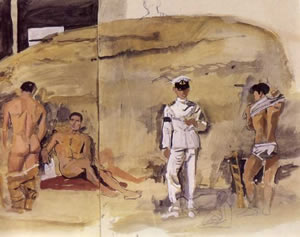
Olivier Delorme (Chalon-sur-Saône, 14 maart 1958)
Het grote strand door Yannis Tsarouchis, 1962
De Franse schrijver, tekenaar, schilder, karikaturist en journalist Albert Robida werd geboren op 14 maart 1848 in Compiègne.Zie ook alle tags voor Albert Robida op dit blog.
Uit: The Monkey King (Fragment uit:Voyages très extraordinaires de Saturnin Farandoul,vertaald door Brian Stableford)
“The she-monkey understood the reason for these cries. Passing her nursling to the father, she took hold of the infant’s head and generously offered her maternal bounty to the child.
What joy for the little castaway! For many hours he had wandered without nourishment on the crests of the waves, tormented by a hunger he could at last appease! He drank so much that, having suddenly become comfortable again, he ended up falling asleep on the breast of his exotic nurse.
Meanwhile, the little monkeys had been rummaging around in the cradle, to make sure that it did not contain a second example of this peculiar species. They had found nothing there but a kind of bag sealed by a leather thong. This bag intrigued them enormously at first sight, but their perplexity was even further increased by the sight of the piece of paper that the eldest of the little monkeys took from it. They turned it over and over without result, then passed it to their father in the hope that he might explain it. After examining it for a quarter of an hour, he too could make nothing of the bizarre symbols with which it was covered.
The thing was very simple, though; let us admit right away that the bag found in the cradle was a tobacco-pouch–probably the paternal tobacco-pouch, which the unhappy parents had confided to the hazards of the tempest along with their child, at the moment when their ship sank. As for the paper covered with hieroglyphs that had so intrigued the naïve orangs, it will clarify for us the status of the young castaway, for it was nothing other than his duly-registered birth certificate.”
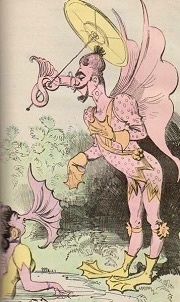
Albert Robida (14 maart 1848 – 11 oktober 1926)
Illustratie uit “Voyages très-extraordinaires de Saturnin Farandoul »
De Roemeense dichter Alexandru Macedonski werd geboren op 14 maart 1854 in Craiova. Zie ook alle tags voor Alexandru Macedonski op dit blog.
Nuit de Décembre (Fragment)
Déserte et blanche, la chambre est pareille à un mort…
Le feu dans l’âtre s’éteint, réduit en cendres… -
Le poète reste tout près, foudroyé par le sort,
Et nulle flamme à ses yeux ne vient se suspendre…
Et son grand génie, au mythe paraît atteindre…
Aucune lueur à ses yeux ne veut se rendre.
Déserte et blanche est la vaste étendue du champ…
Sous la tourmente, il geint à faire pitié…
En bête sauvage, la tristesse le mord à belles dents,
Et la lune le regarde d’un œil d’acier… -
Un blanc monolithe, flou, dans l’obscurité…
Et la lune le regarde d’un œil d’acier.
Autour s’entassent des ombres, par masses, et l’importunent…
Depuis longtemps, l’être d’argile a péri,
Mais son front, toujours altier, reste dans la lune –
Même la blanche pièce est morte dans la nuit…
Depuis longtemps, l’être d’argile a péri.
Bien morte la pièce, bien mort le Poète… -
Au loin, d’horribles loups s’entendent, éraillés,
Qui aboient, qui hurlent, qui montent à l’aveuglette
Un sinistre trémolo de vent étouffé…
La tempête crie… - elle, quel sera son péché ?
Vers le chaos, la tourmente monte à l’aveuglette.
Vertaald door Constantin Frosin
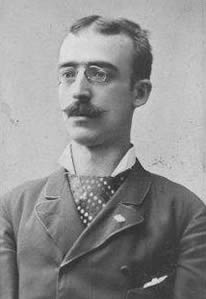
Alexandru Macedonski (14 maart 1854 – 24 november 1920)
In 1878
De Engelse schrijver Algernon Blackwood werd geboren op 14 maart 1869 in Shooter's Hill, Kent. Zie ook alle tags voor Algernon Blackwood op dit blog.
Uit: The Garden of Survival
“It will surprise and at the same time possibly amuse you to know that I had the instinct to tell what follows to a Priest, and might have done so had not the Man of the World in me whispered that from professional Believers I should get little sympathy, and probably less credence still. For to have my experience disbelieved, or attributed to hallucination, would be intolerable to me. Psychical investigators, I am told, prefer a Medium who takes no cash recompense for his performance, a Healer who gives of his strange powers without reward. There are, however, natural-born priests who yet wear no uniform other than upon their face and heart, but since I know of none I fall back upon yourself, my other half, for in writing this adventure to you I almost feel that I am writing it to myself.
The desire for confession is upon me: this thing must out. It is a story, though an unfinished one. I mention this at once lest, frightened by the thickness of the many pages, you lay them aside against another time, and so perhaps neglect them altogether. A story, however, will invite your interest, and when I add that it is true, I feel that you will bring sympathy to that interest: these together, I hope, may win your attention, and hold it, until you shall have read the final word.
That I should use this form in telling it will offend your literary taste—you who have made your name both as critic and creative writer—for you said once, I remember, that to tell a story in epistolary form is a subterfuge, an attempt to evade the difficult matters of construction and delineation of character. My story, however, is so slight, so subtle, so delicately intimate too, that a letter to some one in closest sympathy with myself seems the only form that offers.
It is, as I said, a confession, but a very dear confession: I burn to tell it honestly, yet know not how. To withhold it from you would be to admit a secretiveness that our relationship has never known—out it must, and to you. I may, perhaps, borrow—who can limit the sharing powers of twin brothers like ourselves?—some of the skill your own work spills so prodigally, crumbs from your writing-table, so to speak; and you will forgive the robbery, if successful, as you will accept lie love behind the confession as your due."
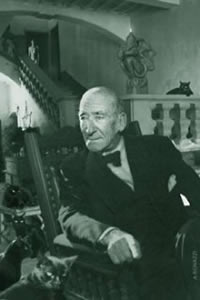
Algernon Blackwood (14 maart 1869 – 10 december 1951)
De Zwitserse dichter en schrijver Paul Ilg werd geboren op 14 maart 1875 in Salenstein (Thurgau). Zie ook alle tags voor Paul Ilg op dit blog.
Nachtwandlerin
Grollend noch, doch schon des Haders müde,
Arg ein Wort — das letzte Blatt im Sturme ~
Und dann sinkt dein Blondkopf in die Kissen,
Schließen sich die trostverwaisten Augen . . .
Wohl dir, Seele, die so leicht entschlummert!
Dumpf und drohend liegt vor mir die Nacht,
Soll ich wieder alle Stunden zählen,
Grimmig, wie der blinde Maulwurf graben?
Aufgewühlter Schmerzen Dornenkrone,
Zum Ersticken eine Glut im Halse —
Ach die Qual der sieben teuern Jahre —
Und die Furcht vor Nimmerbesserwerden.
Schlaf, wo bleibst du, himmlischer Erlöser?
Mir nicht minder mangeln deine Gnaden.
Da — was regt sich, tastet mir entgegen?
Sehen kann ich's nicht, nur spüren, greifen —
(Oh vor Glück krampft sich die Brust zusammen!)
Deine Hand, wie nach Versöhnung schmachtend,
Nach der meinen traumhaft innig suchend —
Sei willkommen mir, Nachtwandlerin !
Alsbald ist der zarte Bund geschlossen,
Ruhen Schwester, Bruder ineinander.
Still, kein Wort! Ich lausche deinem Atem . . .
Unverändert schlagen noch die Pulse,
Lippen, Wimpern wie zuvor geschlossen —
Und doch blüht ein Heil in deinen Zügen.
Welche Sendung ! Balsam meinen Wunden . . .
Warm ein Strom von grundauf mir ins Auge
Tropfen all die Bitternisse nieder.
Wie vom Blumenkelch in Regenschauern
Fällt der Staub des Tages von mir ab.
Dass ich jubeln dürfte, beten, lachen!
Doch, als war's ein goldbetupfter Flügel,
Bett ich sanft das Kleinod, den Gespielen
Trauter Stunden, mir ans heiße Herz.
Habe Dank denn, Herrin meines Lebens!
Selig hiss ich noch das grüne Fähnlein
Unsrer Hoffnung. Und in Morgenfrühe
Wird sein Flattern deine Seele wecken.
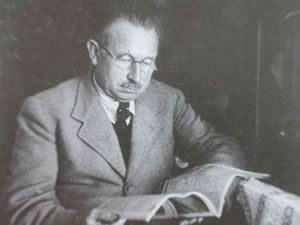
Paul Ilg (14 maart 1875 – 15 juni 1957)
14-03-2015 om 12:58
geschreven door Romenu 
Tags:Albert Robida, Olivier Delorme, Alexandru Macedonski, Algernon Blackwood, Paul Ilg, Romenu
|

